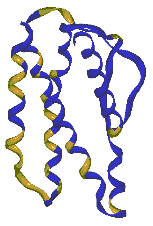| 2006 |

|
YEAR BOOK |
Dublin City University
|
Molecular evolution and bioinformatics uncover key events in human evolution
|

Our analyses have yielded many interesting and significant findings for human diseases such as XSCID (X-linked severe combined immunodeficiency disease) and cancer. XSCID is a severe immunological disease and is fatal unless treated. It is caused by deletion or mutation of the common gamma chain of the receptor complex of a group of interacting cytokine. Interestingly, the phenotypic effect of XSCID differs between human and mouse. For example, it is known that in humans T cell and NK cells are dramatically decreased in XSCID cases whereas B cell production is completely normal, however in the mouse XSCID model B cell numbers are greatly diminished. The underlying causes of these and indeed many other differences are not known but are crucial to understanding the immune response. We have determined specific amino acid sites that have undergone positive selection in these cytokines in the human lineage and not the mouse, see inset1. Our research into human protein evolution has found positive selection acting on a number of proteins. Other intriguing examples include the discovery of positive selection acting on essential members of a metabolic pathway that is also an early marker for human cancers2.
Research into mammalian (human) molecular evolution using bioinformatic software will contribute significantly to our understanding of human health and the immune system in the coming years. These and many other projects are currently underway, in the School of Biotechnology DCU, to address fundamental questions in molecular evolution and evolutionary biochemistry.
References:
[1] M.J. O'Connell. and J.O. McInerney. "Gamma chain receptor interleukins: evidence for positive selection driving the evolution of cell-to-cell communicators in the mammalian immune system". J Mol Evol. 2005 Nov;61(5):608-19
[2] M.J. O'Connell. and J.O. McInerney. "Adaptive evolution of the human fatty acid synthase gene: support for the cancer selection and fat utilization hypotheses?" Gene. 2005 Nov 7;360(2):151-9
Contact: Dr Mary J. O'Connell
Molecular Evolution and Biorinfromatics Group, School of Biotechnology, Dublin City University, Glasnevin Dublin 9.
Tel: +353 1 700 5112
E-mail: [email protected]